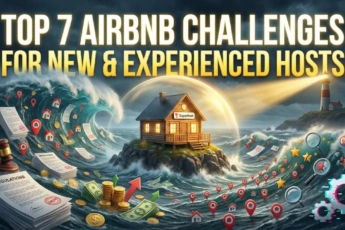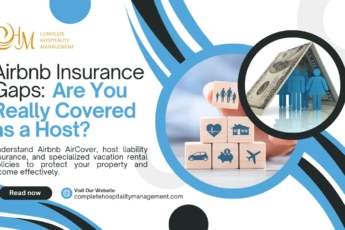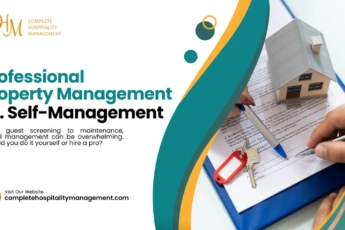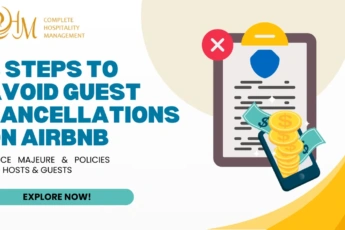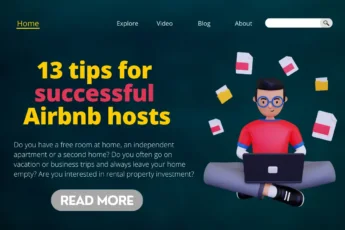10 Most Common Airbnb Disputes Resolution with Guests in 2026 – Clear Instructions on How to Deal with Them as a Host
Airbnb has become a go-to platform for travelers and hosts around the world, facilitating access to unique and diverse accommodations. However, as in any relationship, conflicts can arise. Common disputes with Airbnb include safety issues, last-minute cancellations, non-refunds for damages to the home or amenities, early check-ins or late check-outs, unauthorized parties, or tenants who refuse to leave after their stay.
Let’s look at the most common disputes that Airbnb hosts face during their activities and how to solve them with minimal time, effort and money.
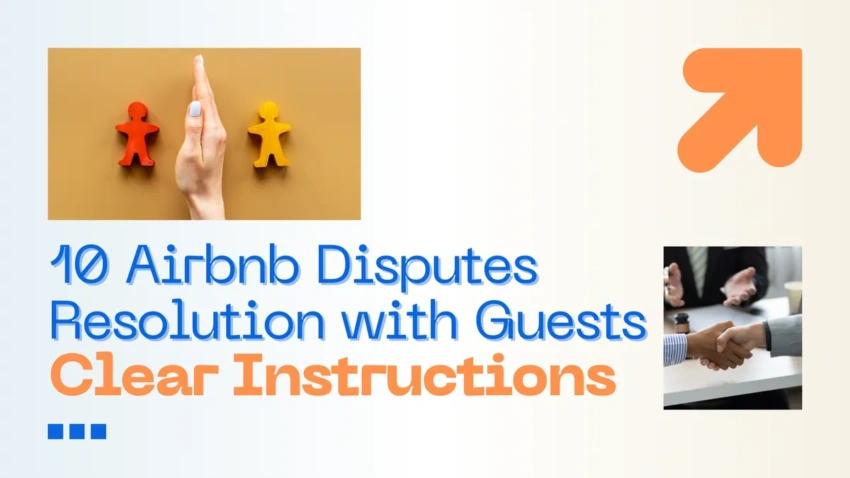
10 Most Common Airbnb Disputes Resolution with Guests
Most Common Airbnb Disputes Before Guests Arrival
You’ve got a new booking, and you’re ready to make money. But it turns out things aren’t going as well as you’d hoped. According to a study by Airbnb, 3% of Airbnb rentals have been the subject of a noise complaint or unauthorized parties.
Common disputes and recommended resolutions for Airbnb hosts
| Phase of the stay | Common issues | Solutions advised |
|---|---|---|
| Before arrival | – Rental rules not respected | Clearly define the rules in the listing. |
| – Early check-in and late check-out | Specify the hours in the listing and stand firm on the rules set. | |
| – Potentially problematic reservations |
Use instinct and experience to anticipate problems; Cancel if necessary with caution. |
|
| During the stay | – Equipment problems |
Maintain regular maintenance React quickly in the event of a problem. |
| – Noise |
Communicate with neighbors Consider insulation improvements. |
|
| – Conflicts between guests | Intervene in a neutral and professional manner to resolve disputes. | |
| – Unauthorized parties |
Intervene firmly Contact Airbnb and authorities if necessary. |
|
| After departure | – Missing or stolen items |
Check and charge for missing items; do not place valuables in the rental. |
| – Bad comments |
Respond professionally and moderate via Airbnb if necessary. |
|
| – Broken or damaged equipment |
Use a security deposit, consider appropriate insurance to cover damages. |
Here’s how to resolve Airbnb issues before your guests even arrive.
1. Early check-in and late check-out
Sometimes, your guests want to check in early or check out late. Whether it’s the case, chances are it’s not a good fit for you. The best way to nip this Airbnb conflict in the bud is to address it in your listing description.
To avoid early and late check-ins on Airbnb, make it very clear in your listing what time slots you impose and what tolerance is negotiable. Inform your guests that:
- you cannot accommodate changes to check-in/check-out times
- or give them minimal notice before any changes
- if you have already mentioned this in your Airbnb listing but the guest is unaware, politely decline the changes.
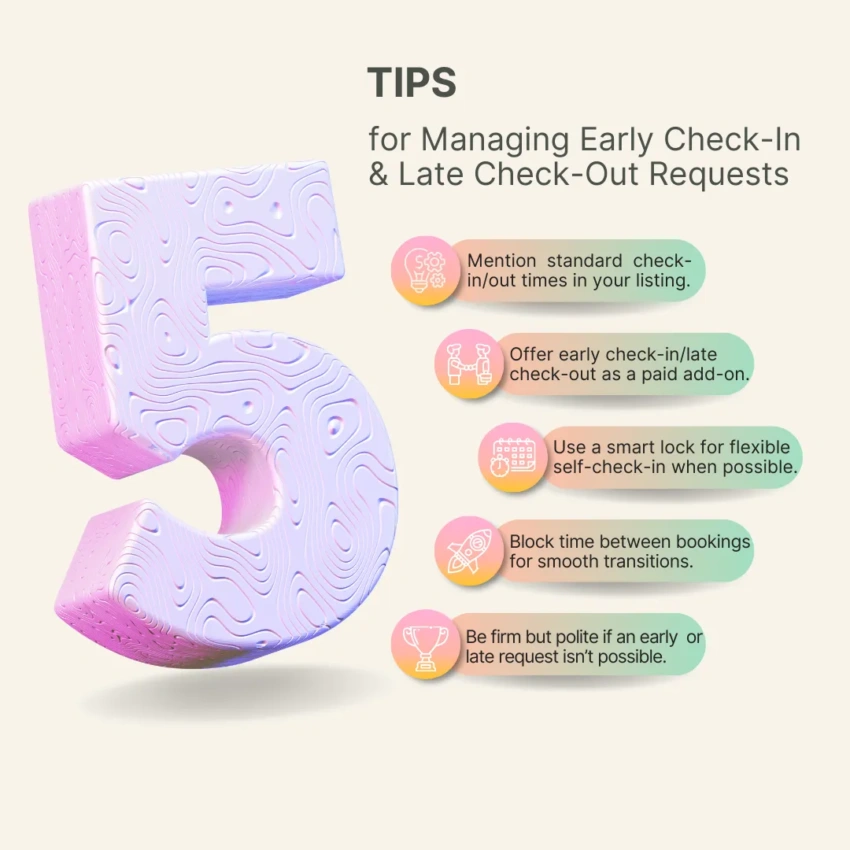
5 Tips for Early Check-In or Late Check-Out Requests
In most cases, the guest will not insist and will accept your rules. However, if you can allow early check-in or late check-out without it being a huge hassle, do it and make your guests happy!
2. Getting a reservation to cancel
Sometimes, you feel things will go wrong before your guest even arrives. Whatever the reason, you know you want them to cancel their reservation. With experience, a host senses these things very reliably. Maybe these guests have high expectations, or you are worried they will throw a party at your property and break things.
So, you should be aware of the fact that Airbnb imposes penalties for cancellations, as it can have serious implications on your guest’s trip. So in case you want to become a Superhost, you must have a response rate of 90% or more and NEVER cancel a confirmed reservation.
- Think carefully about whether or not canceling is really necessary.
- Last-minute cancellations are a common reality for Airbnb hosts.
To cancel a reservation on Airbnb, simply go to Your Reservations and select Cancel to start the cancellation process. But this is very penalizing for the host in Airbnb’s algorithm. If the reason you want to cancel the reservation is not related to the guest, this situation may work in your favor. You can avoid penalties if you contact Airbnb to let them know that you want to cancel the reservation due to extenuating circumstances.
3. Last-minute cancellations
One of the most critical Airbnb disputes for a host is experiencing an unexpected cancellation (and it’s always at the worst possible time).
It’s important to note that cancellations can negatively impact your Superhost status. To become a Superhost, you must have a response rate of at least 90% and never cancel a confirmed reservation.
To avoid such problems, select a strict cancellation policy. Under this policy, your guests will be entitled to a full refund if they cancel the reservation at least 14 days before the check-in time. The good news is that according to thousands of simulations from Airbnb’s big data, hosts who selected this policy were unaffected by their occupancy rate.
Airbnb Disputes During Guests Stay
Your guests have arrived but now things are starting to go wrong. One of the most common problems during a guest stay is equipment issues.
We’ve had issues with everything from plumbers to appliances. To avoid this, we perform regular maintenance on my property and have a contingency plan in place in case something goes wrong.
4. Equipment issues
The shower head is broken, there is no hot water, and the garage door won’t close. No matter what issue you’re having with your Airbnb rental: you need to let your guest know that you’ll fix it right away.
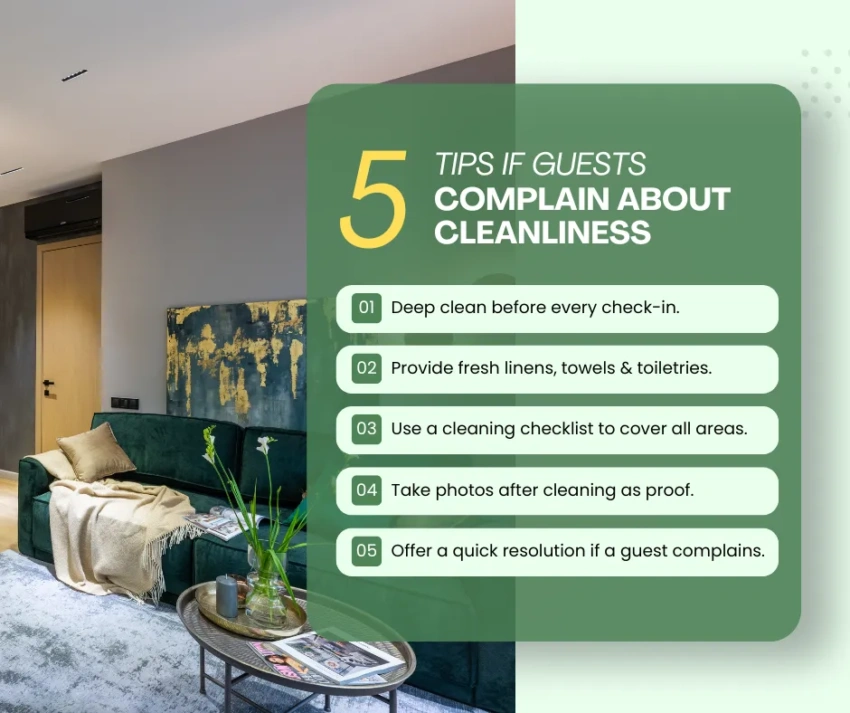
5 Tips to Avoid Cleanliness Complaints
Make sure to say you’re sorry first, then move on to fixing the problem. You should also tell your guests to call you promptly if anything happens during their stay so you don’t get a nasty surprise after they leave. You don’t want to find out that the toilet overflowed two days after your guests left when they left you a review!
5. Constant noise problem
Another Airbnb conflict hosts encounter is guests complaining about neighbor noise. While it’s not your fault, you’re still responsible for your guests’ experience.
- Call the neighbors and let them know that the noise is a bit of a nuisance.
- If the noise is a recurring issue, you may want to rethink the layout and insulation of your short-term rental.
- If the noise problem persists, you need to address it, or negative reviews will flood in and put your hosting business at risk.
- When an equipment issue arises, responding quickly and professionally is important. This will minimize the disruption to your guests and preserve your reputation as a host.
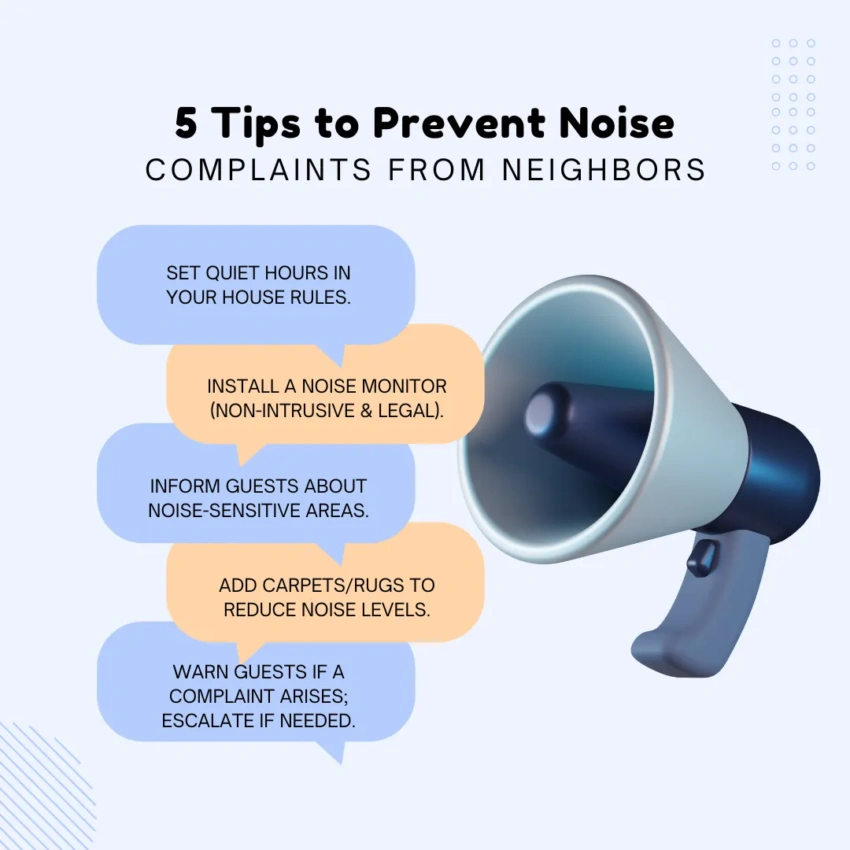
5 Tips to Prevent Noise Complaints from Neighbors
Here’s a testimonial from an Airbnb host that illustrates the importance of timely and effective communication when an equipment issue arises:
“Recently, one of my guests alerted me to a plumbing issue right after he arrived. I immediately apologized for the inconvenience and called a plumber, who fixed the problem the same day. This proactive approach helps me maintain positive reviews and ensure a pleasant experience for all my customers.”
6. Parties at Airbnb accommodation
If you are faced with an Airbnb party, it is important to remain calm and act decisively. Do not hesitate to contact Airbnb and law enforcement if necessary. If your vacation rental is in a tourist location, you can expect that at least some of your guests will be looking to party.
While you are probably already taking as many precautions as possible to keep alcoholic beverages out of your home, partying is one of the most common disputes with Airbnb.
- If your Airbnb guests are partying and turning your place into a nightclub, you should get them out as soon as possible. Cancel the reservation and make sure to document everything that happens so you can respond to Airbnb and law enforcement.
- If the problem is less serious, you can try to let them know that your neighborhood is a family neighborhood and that they need to keep the noise and any disturbances down. However, if this approach doesn’t work after one try, it’s time for them to leave.
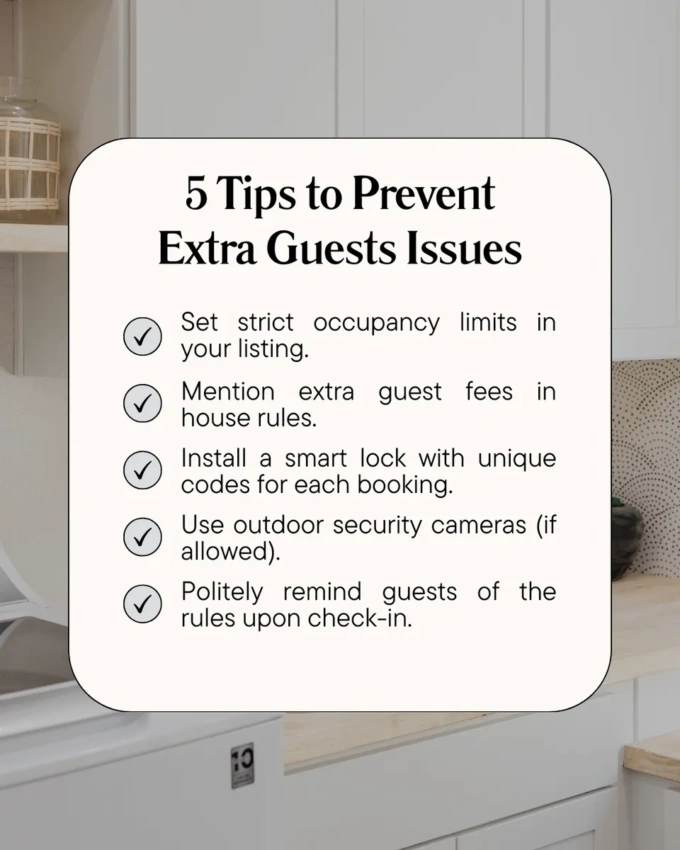
5 Tips to Prevent Extra Guests Issues
7. Guests are arguing with each other
If your guests are staying at your place and they’re not getting along anymore, what can you do?
- If your tenants are arguing with each other or fighting, don’t take sides, talk to each guest and try to find a compromise.
- If you don’t like your guests or they don’t like you, stay nice and polite because Airbnb doesn’t do sentimentality.
- You also don’t have to keep going out of your way to resolve the situation as if the guest were a friend. Just limit your communication to a professional attitude.
- If the guest does something inappropriate and you can prove it, that’s when you can ask them to leave your property. However, you should avoid canceling the reservation if you can resolve the issue without doing so.
Here is a story from a host who had to manage tensions between guests, illustrating the importance of remaining neutral and professional in such situations:
“I recently had a situation where two of my guests began to argue violently during their stay. Without taking sides, I spoke calmly to each of them to understand their grievances and attempted to mediate to find a compromise. Despite the tension, I maintained a professional attitude throughout the incident. This helped defuse the situation without having to ask anyone to leave the premises.”
Airbnb Disputes After Your Guests Leave
Your guest has left and now you’re in for some nasty surprises. Here’s how to fix Airbnb problems after your guests leave.
8. Misplaced or stolen household items
Your towels, toilet paper, and deck of cards are all gone.
- If you suspect that your tenants have stolen something, first, politely ask the guests if they have seen the lost items. Look everywhere before making accusations. Then charge for replacements.
- If you are certain that the missing supplies and equipment will not be found, you can easily charge your previous tenant for the missing expensive items.
- If the item is not of great value, you may want to mention it to the guests without charging for it.
These are probably the best options if you want to save yourself time and hassle. To avoid this Airbnb problem, do not put your valuables in your vacation rental. For example, you can rent a storage unit nearby or a garage to keep your expensive items safe.
9. Guest left a bad review
Receiving a negative review is also one of the most common Airbnb issues you may face. Don’t take bad reviews personally. Try to stay calm and respond professionally. You can also ask Airbnb to help you moderate reviews.

Benefits of quick resolution of disputes
To respond to a bad review, a sincere apology may suffice. Otherwise, stay calm and share your side of the story in the response. Focus on the positive aspects of your guests’ stay and describe how you tried to resolve the issue.
Reply politely to all reviews. This will show your future guests that you are a caring and respectful host.
10. Broken or damaged equipment
For common mishaps, like discovering that your wine glasses are broken, a security deposit can be a good idea. However, you may want to consider getting vacation rental insurance to cover valuables like jewelry, art, or collectibles that cost more than the amount you withheld as a security deposit.
As the saying goes, “Forewarned is forearmed.”
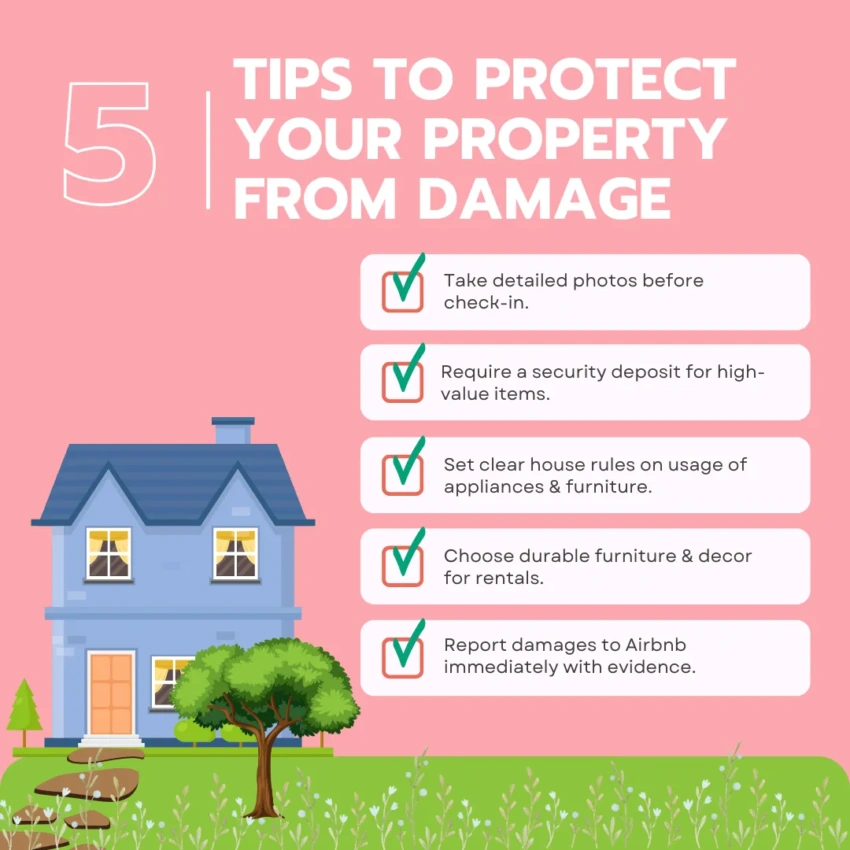
5 Tips to Protect Your Property from Damage
Knowing the potential disputes with your Airbnb vacation rental gives you an advantage. By being aware of the most common Airbnb issues, you can do your best to avoid them. However, even if something does go wrong, the best advice is to stay calm and be a responsible host.
If you have a hopeless situation with guests and you don’t know how to solve it, or you just want to learn more about resolving conflicts with guests, we recommend using Airbnb consulting and personally with an Airbnb Superhost with over 10 years of experience to analyze all sorts of real conflicts and their solutions.
What to Do If an Airbnb Guest
Damages Your Property
When a tenant damages your Airbnb property, it is crucial to handle the situation methodically and efficiently to ensure the issue is resolved and the damages are properly compensated.
Here is a step-by-step process to follow:
- Document the damage immediately after noticing it. Take photos or videos of all damage as soon as possible. This includes clear images of damaged areas, broken items, and any other destruction. Also, be sure to keep receipts or invoices for all damaged items.
- Communicate with the guest through the Airbnb platform to discuss the damage. It is important to remain professional and courteous during this communication. Clearly explain the damage observed and ask the tenant to acknowledge the facts.
- Use Airbnb’s resolution process to handle damages. You can submit a claim for compensation through Airbnb’s Resolution Center. To do so, you must submit proof of the damage (photos, videos, receipts) and itemize the repair or replacement costs that will be required. Airbnb gives you 14 days from the date the renter leaves to file this claim.
- Assess repair costs by professionals if necessary. If the damage is significant, it may be a good idea to hire an expert or tradesman to get a detailed estimate of the repairs that will be required.
- File a claim with your insurance if the damage exceeds what the renter or Airbnb can cover, or if resolution through Airbnb is unsuccessful. Make sure your insurance policy covers Airbnb rentals, as some policies may exclude this activity.
- For future prevention, consider adjusting your security deposit or incorporating stricter house rules. You can also opt for better vetting of renters by reviewing their background and ratings on Airbnb before accepting a booking.
Check out this guide to learn how to respond to a bad Airbnb experience and protect your business. If you’re a new Airbnb host who doesn’t know much yet, we also recommend you check out the 12 most common challenges hosts face.
If the guest doesn’t like their
host (or another guest)
There’s little risk if a tenant rents out an entire property and never sees their host except (possibly) to pick up the keys. But if you’re renting out a spare room in your house or apartment, the close proximity can amplify even minor personality conflicts. A fight over toilet paper is a simple example of how things can go wrong.
Some of these issues can be avoided with a bit of communication. But if you feel like things are getting ugly, both parties can always turn to Airbnb for help as a mediator, via the resolution center.
However, there’s not much Airbnb can do if the issue is simply “I don’t like this person.” In this case, your best bet is to minimize contact and possibly come up with a backup plan B (like a cheap hotel nearby).
If the tenant has lost their
key (or is locked out)
You should include instructions in the welcome booklet of your furnished tourist accommodation. In particular, inform the tenants of the procedure.
Have the tenants call you so that you can come with a spare key or tell them where you have fixed the emergency key box in case of a problem. In this situation, a host is legitimate to charge the cost of a new key and/or change the locks on the security deposit (if you request one as a host).
What to Do During a Dispute
With the Host or Tenant
If you are faced with a situation where your tenant or host has not respected the terms of the rental agreement, there are several options available to you to resolve the dispute:
- Resolution amicably: Attempting to resolve the conflict directly with the opposing party is often the best first step, especially for less serious issues, such as departure arrangements or minor maintenance issues.
- Recourse to the Airbnb Resolution Center: If an amicable resolution does not succeed, you can ask Airbnb for help through their Dispute Resolution Center to facilitate mediation or intervention.
- Legal proceedings: If the previous steps fail, it is possible to take legal action. Depending on the amount of the dispute, you can initiate proceedings in the district court or pursue a court summons.
Each of these steps offers specific ways to address and potentially resolve a dispute, ranging from direct negotiation to more formal measures such as litigation.
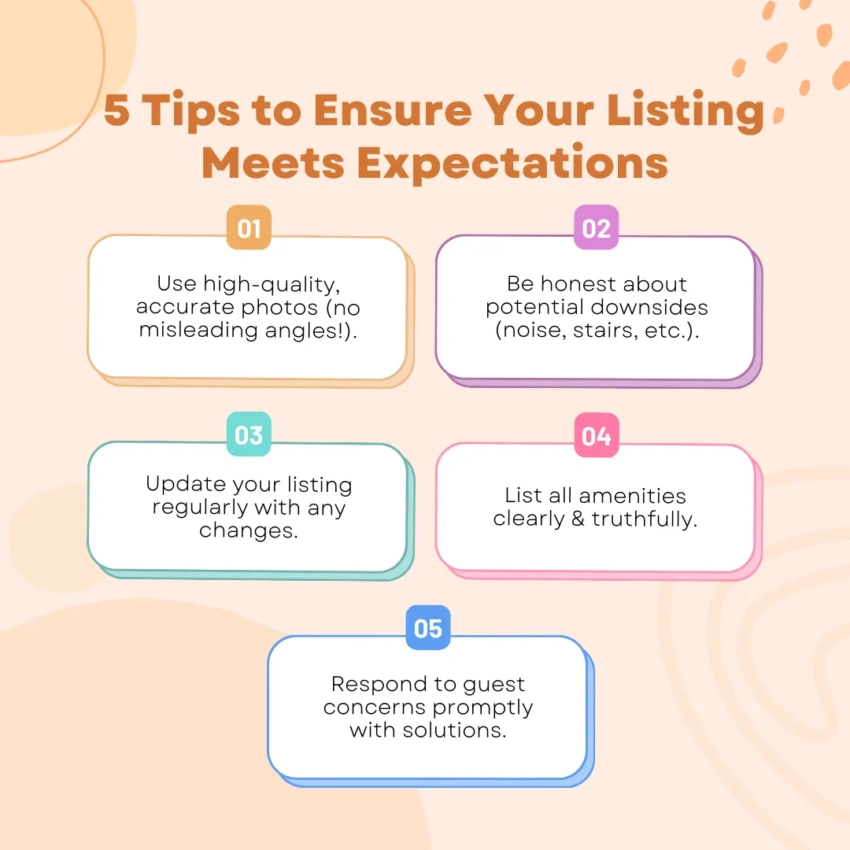
5 Tips to Ensure Your Listing Meets Expectations
Around 3% of Airbnb bookings are canceled at the last minute, which can cause major disruption for hosts.
Practical Tips for Optimal Resolution
of any Airbnb Disputes
Here are some practical tips to improve your chances of resolving an Airbnb conflict effectively and positively:
- Keep all messages exchanged with the host or guest through the Airbnb platform, as well as booking confirmations, payment receipts, etc.
- Use clear and professional language in your communications, avoiding insults or accusations.
- Be clear about your requests and expectations, remaining realistic and proposing solutions that are acceptable to both parties.
- Be patient and persistent, as conflict resolution can take time.
- Be ready to go through a complex process, but by following all our tips and applying them, you have every chance of finding a satisfactory solution.
We would like to emphasize that still, communication is the key to effective conflict resolution. Remain calm and professional, and do not hesitate to seek assistance from Airbnb customer service if necessary.
Liability Coverage with Airbnb
Airbnb provides protection through AirCover, which includes liability insurance for hosts. This insurance covers the following incidents:
- Physical injuries to guests;
- Damage and theft to guests’ property;
- Damage caused by a guest to common areas and neighboring properties.
However, there are some exclusions to Airbnb’s coverage:
- Damage resulting from intentional acts;
- Damage inflicted by a guest on your home and personal belongings.
- For complete protection of your property and its contents, consider purchasing comprehensive home insurance.
It is crucial to read the terms of the contract carefully to fully understand the extent of the coverage, which can vary between insurers.
Amenity complaints account for 15% of negative reviews on Airbnb. The most common issues include down Wi-Fi, faulty appliances, and plumbing issues.
3 Cases of Airbnb Disputes with Resolutions
Airbnb disputes between hosts and guests are inevitable, but handling them effectively can save time, money, and stress. Here are three real-life cases showcasing common conflicts and practical resolutions. These cases highlight how clear communication, firm policies, and prompt action can help resolve disputes smoothly.
Case 1: last-minute cancellation by guest with a refund request
Situation: a guest booked a beachfront villa for five nights but canceled the reservation just two days before check-in. They claimed a “family emergency” and requested a full refund, despite the villa having a strict cancellation policy (no refund within 14 days of check-in).
Resolution: the host politely reminded the guest of the strict cancellation policy, emphasizing that the villa was blocked for their stay, preventing other bookings. However, to maintain goodwill, the host offered a partial refund for any nights that could be rebooked. Additionally, the host advised the guest to check if Airbnb’s Extenuating Circumstances Policy applied. The guest accepted the partial refund, and the host successfully rebooked two nights, minimizing financial loss.
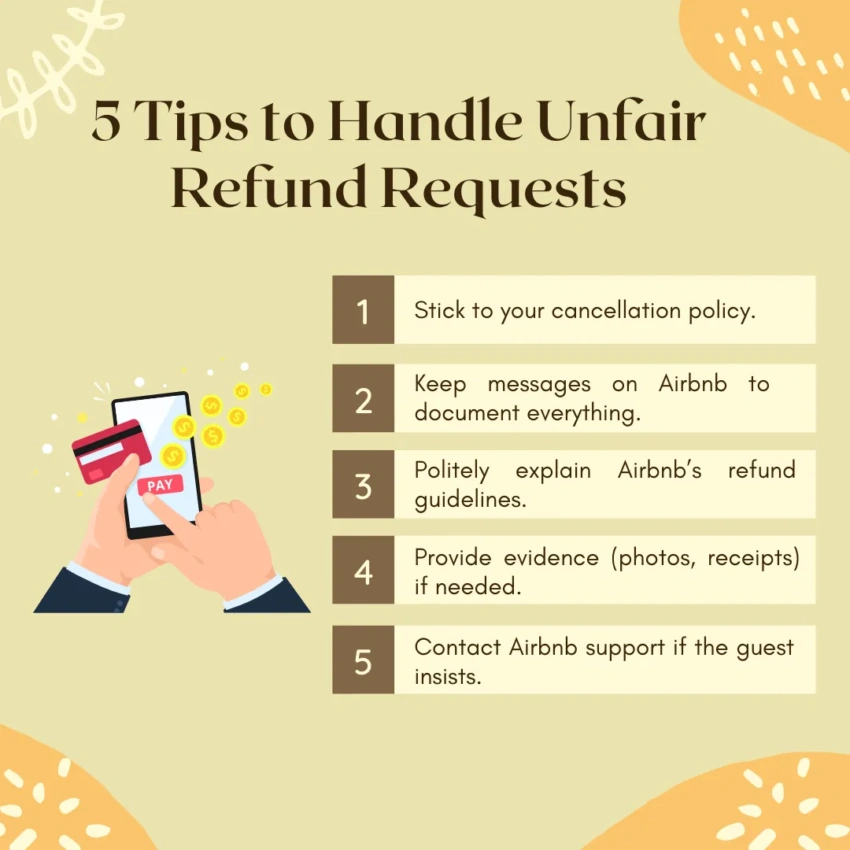
5 Tips to Handle Unfair Refund Requests
Lesson learned: a strict cancellation policy protects hosts from last-minute cancellations. However, offering a compromise can maintain a good reputation and reduce negative reviews.
Case 2: unauthorized party at the property
Situation: a host received noise complaints from neighbors about a group of guests throwing a loud party at the rental, despite the listing strictly prohibiting parties. Upon checking security footage, the host confirmed that unregistered guests had entered the property.
Resolution: the host immediately contacted the guests through Airbnb messaging, reminding them of the no-party rule and asking them to stop the gathering. When the guests did not comply, the host reported the issue to Airbnb, providing video evidence. Airbnb canceled the reservation, and the host requested damages for deep cleaning and minor repairs through Airbnb’s Resolution Center. Airbnb supported the host’s claim, and the guest was charged for the damages.
Lesson learned: clearly stating house rules, using security cameras (outside only), and acting swiftly can help prevent unauthorized parties. Having Airbnb’s support and proof of violations is crucial for damage claims.
Case 3: guest leaves without paying for damages
Situation: a guest left the rental without informing the host about a broken coffee table and stained sofa. Upon inspection, the host found significant damage but had not collected a security deposit.
Resolution: the host contacted the guest via Airbnb messaging to ask about the damage. The guest denied responsibility, so the host submitted a claim through Airbnb’s Resolution Center, providing before-and-after photos, receipts for the damaged items, and a professional cleaning invoice. Airbnb reviewed the evidence and ruled in the host’s favor, reimbursing a portion of the repair costs.
Lesson learned: documenting the property’s condition before and after each stay, having short-term rental insurance, and using Airbnb’s Resolution Center for disputes can help protect hosts from financial losses.
As a conclusion
While renting on Airbnb can provide lucrative opportunities and rewarding experiences, it’s essential to be prepared for potential disputes. By anticipating last-minute cancellations, compliance issues, and property damage, you can ensure smooth stays and protect your rental income.
Use the strategies and tips in this article to effectively manage common challenges and provide a pleasant experience for your guests.
Frequently asked questions about
Airbnb disputes resolution
How to handle a last minute cancellation on Airbnb?
Last-minute cancellations can be frustrating. Check previous renter reviews and clearly communicate your cancellation policies to minimize this risk.
What should I do if my accommodation is damaged by a tenant?
Document the damage with photos and videos. Contact Airbnb through the Resolution Center to request compensation.
How do I prevent unauthorized parties at my Airbnb property?
Use strict booking filters, require security deposits, and install noise monitoring devices to detect suspicious activity.
What to do if a tenant complains about cleanliness or amenities?
Respond to complaints promptly and offer immediate solutions. If the issue cannot be resolved quickly, consider offering a partial refund or compensation.
What are a host's rights and responsibilities in the event of a dispute with a tenant?
Review Airbnb’s policies regarding disputes and consider contacting a real estate attorney for specific advice.
How can I ensure that my accommodation complies with local regulations?
Research local short-term rental laws in your area and make sure your property is registered and compliant with these regulations.
How does Airbnb resolve disputes?
How does Airbnb resolve disputes?
Airbnb provides a structured Resolution Center for hosts and guests to resolve disputes. The process typically follows these steps:
- Direct communication. Many disputes can be settled with clear communication and a fair compromise.
- Resolution Center. If an agreement isn’t reached, the host or guest can submit a request in the Resolution Center within 60 days of the reservation ending. Both parties can present their evidence (photos, messages, receipts, etc.).
- Airbnb support intervention. If there is no response within 72 hours, or if the parties cannot agree, Airbnb’s support team reviews the case. They assess the evidence, terms of service, and the listing’s policies before making a final decision.
- Final decision. Airbnb’s case managers decide on a resolution, such as refunding a guest, compensating a host through AirCover for hosts, or dismissing the claim if it lacks evidence.
How do I win a dispute with Airbnb?
Winning a dispute with Airbnb requires strong documentation, clear communication, and adherence to Airbnb’s policies. Follow these steps:
- Take clear photos/videos before and after a guest’s stay to document property condition. Keep records of house rules and messages exchanged.
- Always use Airbnb messaging (not external platforms) to keep a record of all interactions. Airbnb gives more weight to conversations held on their platform.
- If your claim aligns with Airbnb’s policies (e.g., damages covered by AirCover, extenuating circumstances for cancellations), you’re more likely to win.
- Airbnb has strict deadlines for claims. Report damages within 14 days or before the next check-in. Refund requests must be made within 60 days of the stay ending.
How to raise a dispute with Airbnb?
To raise a dispute:
- Go to the Resolution Center – Log into Airbnb and navigate to Profile > Help > Resolution Center.
- Choose the booking in question – Select the specific reservation tied to the dispute.
- Describe the issue – Provide a detailed explanation of the dispute, including dates, times, and specifics.
- Upload evidence – Attach supporting documents (photos, videos, receipts, messages).
- Wait for guest response – Airbnb gives the other party 72 hours to respond. If they don’t, Airbnb support steps in.
How do I get a 100% refund from Airbnb?
A guest can get a full refund under Airbnb’s Rebooking and Refund Policy if:
- The property is significantly different from the listing (false advertising, major cleanliness issues, safety hazards).
- The host cancels at the last minute, leaving the guest without accommodation.
- The property is uninhabitable due to issues like no electricity, no running water, or pest infestations.
- The guest leaves within 24 hours of check-in and provides evidence of the problem.
To maximize your chances of a refund:
- Document the issues immediately and take photos/videos upon check-in.
- Contact the host first – Airbnb requires guests to notify the host before escalating the complaint.
- Report to Airbnb support quickly if the host doesn’t resolve the issue within a reasonable time. Escalate the case via the Resolution Center within 24 hours.
What happens if you dispute Airbnb charge?
If you dispute an Airbnb charge (e.g., unauthorized transaction, incorrect fee, double charge), Airbnb follows this process:
- Contact Airbnb support – Go to Profile > Help > Payments & Refunds and report the issue.
- Upload bank statements, receipts, or any relevant documents.
- Airbnb reviews the claim, checks its transaction logs, and may contact the host for verification.
- If Airbnb finds the charge incorrect, they process a refund. If the dispute is denied, the guest can escalate through their bank (chargeback), but this can lead to an Airbnb account suspension if misused.
Does Airbnb take complaints seriously?
Yes, but the speed and effectiveness of Airbnb’s response depend on the nature of the complaint and the evidence provided. Airbnb prioritizes:
- Safety-related complaints (illegal activity, harassment, major safety hazards).
- Major listing discrepancies (false advertising, cleanliness, missing amenities).
- Financial disputes (damage claims, security deposits).
However, minor complaints (e.g., minor cleanliness issues, small missing amenities) may receive limited compensation unless they violate Airbnb’s hosting standards. To get Airbnb to take your complaint seriously:
- Use detailed descriptions and supporting evidence.
- Follow proper reporting channels (Resolution Center, Airbnb Support).
- Be persistent and escalate the case if necessary.
How long do Airbnb disputes take?
The duration of an Airbnb dispute depends on the complexity of the case and the response time of the involved parties:
- Simple disputes (mutual agreement) – If both parties agree on a resolution, it can be settled within a few days through the Resolution Center.
- Moderate disputes (Airbnb mediation) – If one party doesn’t respond within 72 hours, Airbnb support steps in. This can take 7–14 days depending on the volume of cases.
- Complex cases (damage claims, refunds, chargebacks) – If detailed investigation or third-party verification is required, it can take several weeks (up to 30–60 days).
- Chargebacks – If a guest disputes a charge through their bank, the process can take up to 90 days or more, depending on financial institutions.
To speed up resolution:
- Submit all evidence immediately (photos, receipts, messages).
- Be responsive to Airbnb’s inquiries.
- Follow up if there’s a delay.
How to get compensation from Airbnb?
To receive compensation, you need a valid claim backed by strong evidence. The process varies for guests and hosts:
✅ For guests (refunds & compensation):
- If the listing does not match the description, has major issues (cleanliness, safety, missing amenities), or if the host cancels last minute, guests can request a full or partial refund.
- Report the issue within 24 hours of check-in via the Resolution Center and provide photos/videos.
- If the host does not offer a refund, Airbnb support will review the case.
✅ For hosts (damage reimbursement):
- If a guest damages the property, hosts can request compensation through AirCover for hosts within 14 days of checkout.
- Airbnb may request receipts, repair estimates, and before-and-after photos to verify the claim.
- If Airbnb grants the claim, the host is compensated either from the guest’s security deposit or Airbnb’s protection program.
Does Airbnb ban you for chargeback?
Yes, Airbnb can ban or suspend an account if a chargeback is filed through a bank without first resolving the issue with Airbnb. Here’s why:
- When a guest disputes a charge with their bank, Airbnb treats it as fraudulent activity or a violation of their Terms of Service.
- The platform will likely suspend or permanently ban the account, preventing future bookings.
- If the chargeback is denied, the guest may still owe Airbnb the money, leading to collections or legal action.
How to avoid an Airbnb ban due to chargeback:
- Always try to resolve the issue with Airbnb support first.
- If you must file a chargeback, inform Airbnb first to avoid account penalties.
What is the biggest problem with Airbnb?
Airbnb has several ongoing challenges, but the biggest issue depends on whether you are a guest or a host:
✅ For guests:
- Misleading listings – some properties do not match photos/descriptions.
- Last-minute cancellations – hosts sometimes cancel unexpectedly, leaving guests without accommodation.
- Hidden fees – cleaning fees, service fees, and high taxes can make Airbnb more expensive than hotels.
✅ For hosts:
- Guest damage & party risks – some guests cause damage, and Airbnb’s AirCover does not always reimburse hosts fully.
- Unfair reviews – negative reviews from unreasonable guests can hurt business.
- Airbnb’s policies – some hosts feel Airbnb sides with guests too often, leading to financial losses.
Can I ask Airbnb for refund?
Yes, guests can request a refund, but success depends on the circumstances and Airbnb’s policies. You’re eligible for a refund if:
- The listing is significantly different (false advertising, missing key amenities).
- There are safety or cleanliness issues that make the property unlivable.
- The host cancels before check-in without offering alternatives.
- The guest leaves within 24 hours of check-in and submits a claim with evidence.
To request a refund:
- Contact the host first and explain the issue.
- If the host refuses, open a case in the Resolution Center within 24 hours.
- Submit photos, videos, and a written explanation.
- Airbnb reviews the case and decides on a refund (full, partial, or denied).
How do I resolve Airbnb problems?
To effectively resolve problems on Airbnb:
- First, try to work things out with the host/guest through Airbnb messages.
- If direct communication fails, file a request in the Resolution Center.
- Document everything with photos, videos, and message logs.
- If no resolution is reached within 72 hours, escalate the case to Airbnb’s customer service.
- If Airbnb is slow to respond, call support and follow up via email.
Updated on: . Author:

